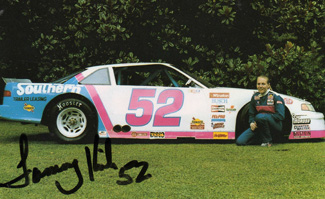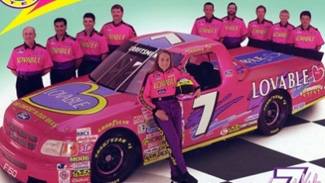
Dalton, Georgia's Tammy Jo Kirk became the first woman to win the famed Snowball Derby back in 1994. Photo courtesy Ronnie Solesbee collection
By Jeff Hood-Guest Contributor
Posted in Feature Stories 3/25/11
It was another day at the office for Tammy Jo Kirk at her motorcycle shop in Dalton, Georgia back in December when word arrived that 18-year-old Johanna Long had won last the 43rd annual Snowball Derby Super Late Model race in Pensacola, Fla.
It was welcome news to the 48-year-old Kirk, the 1994 winner of the Derby. But Long’s win means Kirk is no longer the only female winner of the Derby.
“That is so cool,” said Kirk, when told about Long’s victory. “I had heard that girl was the track champion down there last year. Congratulations to her.”
Kirk’s racing career was hatched on motorcyles. She competed in the AMA National Dirt Track Series during much of the 1980s in an era when men had a difficult time accepting women as competitors.
“I was the only female and you would have 100 riders at most events,” Kirk said. “And to make the main event, you had to make it in the top 15. The last year that I raced (motorcycles), all of the nationals that I went to I made the main event.
“But I quit racing motorcyles because I couldn’t find parts. If you’re a female and you outrun some of the factory guys, you really couldn’t get any parts. I was so discouraged with motorcycles. The last year I raced I made seven main events and didn’t finish one because the motorcyle blew up. We couldn’t get parts to make it last 25 laps.”
So Kirk, who rebuilt her first motorcycle engine at the age of 12, decided to give stock car racing a shot. Her first oval track experience on four wheels came on dirt. She soon made the transition to pavement.
“Jody Ridley was from Dalton and he talked me into racing asphalt cars,” Kirk said. “He helped me a little bit to start with and gave me some ideas.
“And we just went from there.”
As the early 1990s rolled around, Kirk began making a name for herself in on the bullrings throughout the southeast in NASCAR’s popular Slim Jim All Pro touring series.
“I kick myself everyday for not winning a NASCAR Slim Jim All Pro Series race,” she said. “I ran second and third.
“I led one race until the very last lap and I was passing a lapped car and they pushed me out and let one get under me. It was stupid stuff that I should have known better not to do.”
Kirk finally hit racing paydirt when she beat Eddie Mercer and Jeff Purvis to the finish line at Five Flags Speedway in Pensacola on the first Sunday afternoon in December in 1994.
“That was probably the greatest accomplishment I made in stock car racing,” Kirk said. “It was a very tough race. When you look on the trophy and see the people that has won it in the past and look at some of the guys that hasn’t won it, it’s a very prestigious race to win for sure.”

Kirk moved up to the NASCAR truck series in 1997, piloting a Ford for Geoff Bodine.
Following a four-year NASCAR layoff, Kirk ran a limited Nationwide Series schedule for Jay Robinson Racing in 2003. Her best finish was a 21st at Pikes Peak.
By 2004, it was time to focus on selling motorcyles and digging out of debt.
Looking back, Kirk has mixed feelings about carrying the label of a female racing pioneer and trendsetter.
“I’ve been called that, but I really don’t look at myself that way,” she said. “But if you look back, I guess I was because there wasn’t that many women racing.
“In racing, women have come a long way. Danica Patrick has brought women to the forefront now. I think it gets better and better everyday.
“But it’s still tough, don’t get me wrong. In racing, the male just doesn’t like to be beat by a woman for sure. You’ve got more women in the stands that what you had before. I always tell people if I was 20 years younger and know what I know now, I could be running in the Cup Series now because I’d have the racing knowledge, for sure.
“But it would also be on the sponsorship side, knowing how to go out and promote yourself and be a racer. I was one of the these types just wanted to be a hands-on racer. And in this day and time, you can’t do that. You’ve got to be a spokesperson. You’ve got to be really be marketable. And I know now you have to be more outgoing or flamboyant to bring attention to yourself.”
Editor’s note: This story was originally published at Racin’ Today.com on December 12, 2010.
Jeff Hood wrote for The Atlanta Journal-Constitution from Oct. 2003 through March 2009. He covered NASCAR for the AJC from 2005 through 2008 and had a weekly NASCAR-theme radio show on WMOQ 92.3 FM in Monroe, Ga. from 1999 through 2005. In addition, Jeff wrote press releases and handled the P.A. for Lanier National Speedway in Braselton, Ga. from 1998 through 2004.
Questions, comments, suggestions? Email us!
This website is not affiliated with or endorsed by the Georgia Racing Hall of Fame or the Georgia Auto Racing Hall of Fame Association, Inc. All content is the intellectual property of the individual authors. All opinions are those of the individual authors. Please do not repost images or text without permission.
